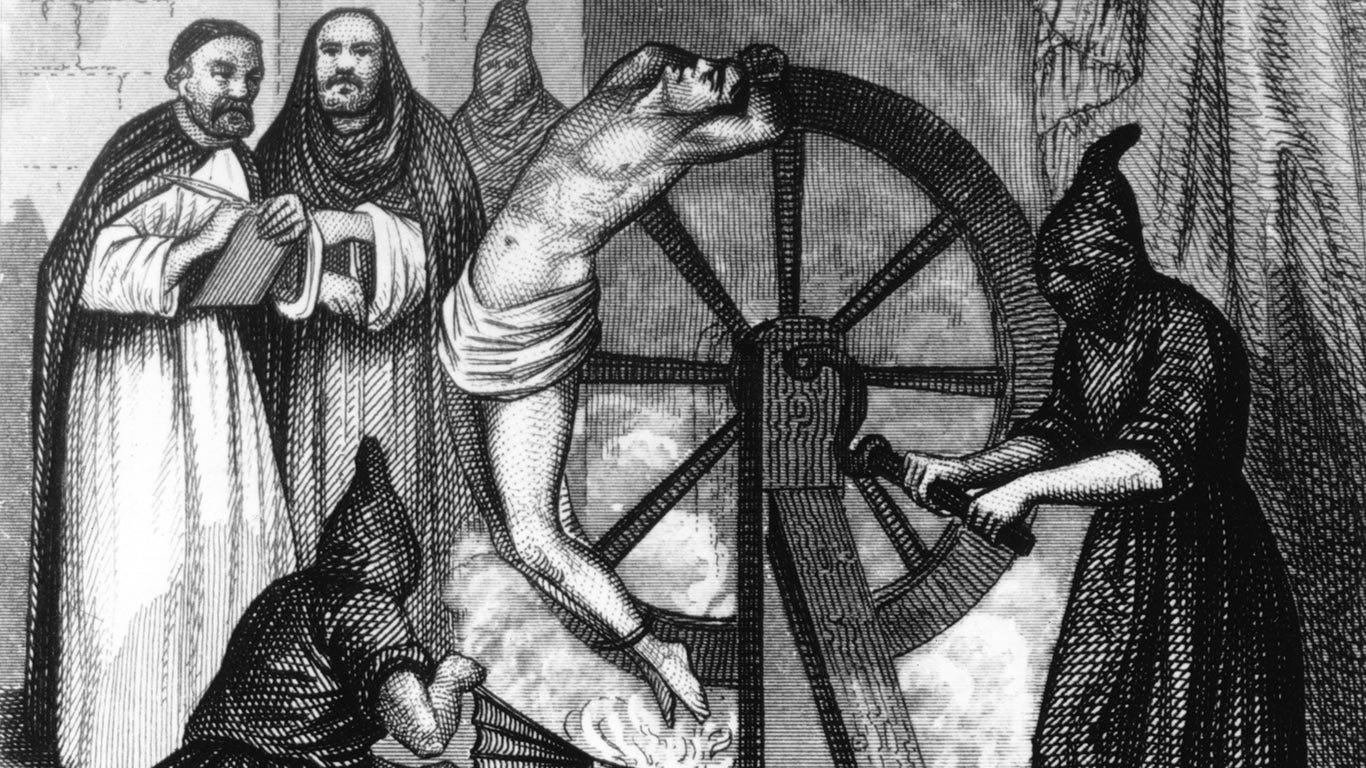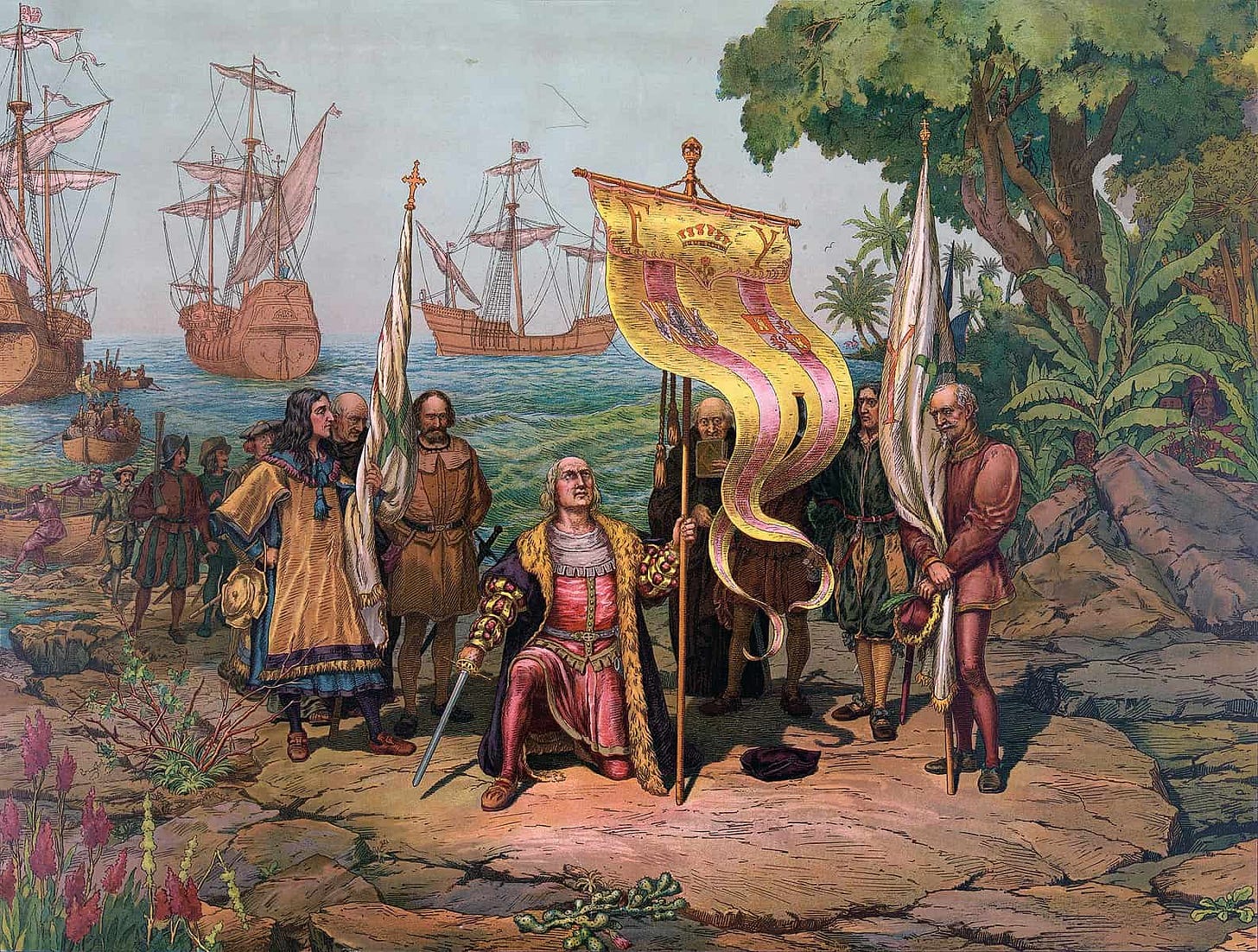Doctrine of Christian Discovery, land theft, and US Property Laws
This is the first of a three-part series about the Pope panicking after the fall of Constantinople in 1453, the desperation to expand Christendom and force the conversion of “heathens” across the globe to counter the spread of Islam, and how the US Supreme Court made late medieval Papal bulls the foundation of US property law.
Not kidding.
In fourteen hundred ninety-two Columbus sailed the ocean blue. "Indians! Indians!" Columbus cried; His heart was filled with joyful pride. But "India" the land was not; It was the Bahamas, and it was hot. The Arakawa natives were very nice; They gave the sailors food and spice. Columbus sailed on to find some gold To bring back home, as he'd been told. He made the trip again and again, Trading gold to bring to Spain.
When Columbus set sail for India (and accidentally “discovered” North America), the world was a very different place. We are taught that he set sail from Spain, but Spain did not yet exist, nor did France, Germany, or Britain. Europe as we think of it today was a hodgepodge of lands, peoples, kingdoms, principalities, and city-states, most of them part of a shared cultural and religious community under the Roman Catholic Church. It was called Christendom.
Two of Christendom’s kingdoms were the Kingdom of Castile and the Crown of Aragon, united by the marriage of Ferdinand and Isabella. These two kingdoms had just conquered Granada, ending nearly 800 years of Muslim rule in the south of what is now Spain, ending the Reconquista. They launched the Spanish Inquisition, leading to widespread torture, forced conversions, and executions of thousands deemed heretical, primarily Muslims and Jews.
Ferdinand and Isabella sponsored Columbus, who also had Papal blessing. Reeling from the fall of Constantinople to the Muslim Ottoman Turks only 40 years earlier, the Church was desperate to conquer new lands to counter the spread of Islam. They were also going broke after 400 years of costly Crusades aimed at reclaiming Jerusalem and the Holy Land and needed to replenish their coffers with gold.
Anxious to increase its influence and authority by promoting Christian expansion to new lands and through forced conversion of new people, various Popes issued a series of Papal Bulls, giving the kingdom of Portugal, and then the Kingdom of Castile and the Crown of Aragon, and then the rest of Christendom, the right to "invade, search out, capture, vanquish, and subdue all Saracens and pagans whatsoever, and other enemies of Christ wheresoever placed, and the kingdoms, dukedoms, principalities, dominions, possessions, and all movable and immovable goods whatsoever held and possessed by them and to reduce their persons to perpetual slavery, and to apply and appropriate to himself and his successors the kingdoms, dukedoms, counties, principalities, dominions, possessions, and goods, and to convert them to his and their use and profit."
And thus the Atlantic slave trade began, under authority of the Pope.
"Let us in the name of the Holy Trinity go on sending all the slaves that can be sold" wrote Columbus, who was specifically named in one the Papal Bulls. And this was exactly what he did, too, capturing 500 Indigenous Arawak - men, women, and children - and sending them back to Aragon & Castille to be sold in slave markets. Half of the Arawak died on the journey. Their bodies were thrown overboard.
In time, this would become known as the Doctrine of Christian Discovery.
Three hundred years later, Supreme Court Justice John Marshall would reach back to these Papal Bulls to dispossess Native Americans of their land, using these orders to expand Christendom as the foundation for US property laws.
What is does it mean to “discover”?
What exactly is meant by "discovery"?
My father-in-law, a Chicano activist and educator, likes to remind us that you can't claim to have discovered someplace if there are people there to greet you when you arrive.
The Catholic Church disagrees. "Discovery" to the Church means to be the first Christians to arrive. The Papal bulls made clear that they expected to find “kingdoms, dukedoms, principalities, dominions” populated by non-Christians. To the Church, Indigenous Peoples, because they were non-Christians, were not human and therefore the land was empty or terra nullius. If there were entire cities built on the land by non-Christian folks, that didn't count.
All the Christian man needed to do upon arrival was plant a flag, erect a cross, or conduct a Christian ceremony, and that would be enough to “discover” the land and seize it from its Indigenous inhabitants. And while the white Christian was at it, he could convert, enslave, or slaughter the Indigenous folks.
Stay tuned for Part 2, where we discuss the Chief Justice John Marshall’s trilogy of cases in which he uses the Doctrine of Discovery to invent US property law, calls the Indigenous people ungovernable savages and strips them of nearly all rights, including the right to sue the government, and Part 3, in which Ruth Bader Ginsburg reaffirms the Doctrine of Discovery as law and says that while it is now legal for Indigenous tribes to sue the government, it would be too disruptive to white colonialists to let them win. And, finally, why this should matter to you.




